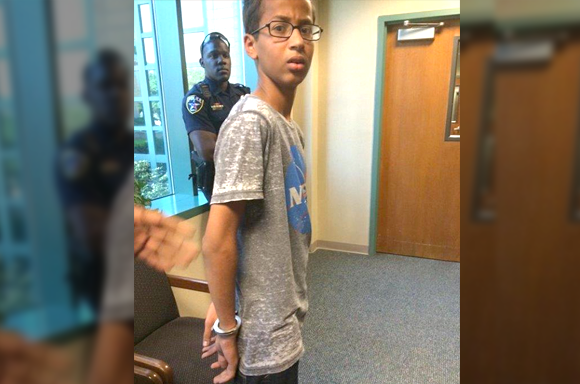
Last Sunday night in Irving, Texas, a 14-year-old boy named Ahmed Mohamed got bored. But instead of firing up his X-Box for a few rounds of Counterstrike or checking up on his fantasy football progress, Ahmed decided to build a digital clock from scratch. He likes to tinker.
By now you’ve probably heard what happened next: When Ahmed took his masterpiece to school the next day to impress his teachers, the clock was confiscated and Ahmed was pulled out of class. He was interrogated by five different police officers. His belongings were searched. He was threatened with expulsion. He was accused over and over and over again of wanting to build a bomb, or wanting people to think he’d built a bomb. He repeatedly requested to contact his parents, and those requests were denied.
Instead, law enforcement agents handcuffed the frightened high school freshman wearing a NASA t-shirt, frog-marched him out of school, and remanded him to a juvenile detention center where they snapped mug shots and took his fingerprints. The school suspended Ahmed for three days, and until the story went viral, police were considering charges.
How could this have happened?
The first and most obvious answer is racism and Islamophobia. Ahmed is Muslim, and Irving has something of a checkered history with the Muslim community. In 2012, the Irving Independent School District commissioned a 72-page report to determine if its curriculum was too pro-Islam. (It wasn’t.) In a response to a local mosque setting up a mediation panel for its worshippers, earlier this year the Irving city council voted to support an anti-Islamic bill that would forbid Texas judges from applying Shariah law in their decisions (This was, of course, already the law.)
Islamophobia, and probably racism, certainly played a role in Ahmed’s ordeal, but the fact is overzealous administrators, zero-tolerance policies, and law enforcement officers ill-equipped to deal with schoolchildren have compromised educational environments throughout the country.
If we’re handcuffing autistic children at the elbows or throwing them in jail overnight, then we’re failing them. If we’re hitting kids with felony weapons charges for bringing fishing tackle to school, then we’re failing them. And if we’re using suspensions (which absolutely do not work) against students who build clocks, or twirl pencils, or write about pot, or chew their Pop-Tarts into the shape of a gun, then we’re failing them.
The Texas Commission on Law Enforcement is currently developing a specialized police-training program for officers who work in our schools. The sooner, the better. Officers need to understand that they’re dealing with children rather than criminals. They need to ensure that a child’s right to contact their parents is as sacrosanct as any other individual’s right to speak to an attorney. And above all, they need to undertake a comprehensive review of their racial-profiling practices and cultural-sensitivity training — oh yeah, and their use of handcuffs.
Ahmed suffered through a terrifying, traumatizing, and unjust ordeal. Yet because of the mass exposure of what he endured, he’s received invitations to the White House, Facebook headquarters, and the Google science fair. I’m fairly certain that Ahmed is going to come out of this just fine. He’s called it the American dream come true and for him it seems to be so.
For too many others — the ones whose stories won’t go viral — the possibility of the American nightmare remains too real.


